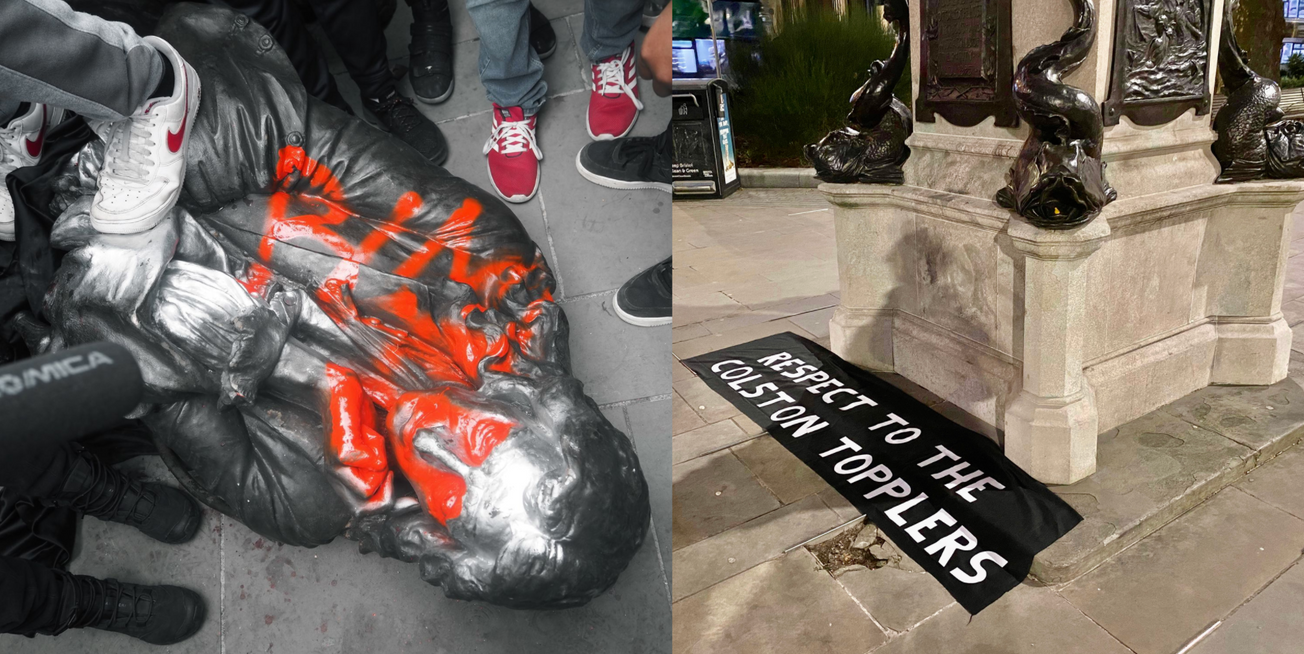By Joseph Marshall, Deputy Editor
NEWS: ‘Colston 4’ acquitted of criminal damage
A year and a half on since the toppling of the statue of Edward Colston, the four defendants who stood trial for criminal damage have been acquitted by a majority jury verdict at Bristol Crown Court today. We should see the outcome as an indication that racial politics in the UK is heading in the right direction, and as something to build on in combatting racial injustices.
BREAKING: The #Colston4, who stood trial over toppling the statue of Edward Colston in June 2020, have been found not guilty of criminal damage by majority jury verdict in #Bristol.#ColstonFour #Colston pic.twitter.com/CRxghoRAfF
— Epigram (@EpigramPaper) January 5, 2022
The case was framed by the prosecution as a simple matter of criminal damage, where the details of Colston, the legacy of slavery and twenty-first century racism were irrelevant.
But of course, how could it be seen in such a sterile light when you consider the storm that the statue’s toppling ignited back in June 2020. Its toppling provoked conversation in the international media, national politics and, crucially, within wider society about modern Britain's relationship with its history of racism, and the role that statues play in this relationship.
The defence rightly reflected this, noting that the Four were on ‘the right side of history’, while the court heard from former Bristol Lord Mayor Cleo Lake who considered Colston as ‘responsible for brutalising my ancestors, taking away their humanity’.
The jury agreed that this indeed justified the pulling down of the statue by those on trial, in contrast to the likes of Home Secretary Priti Patel who at the time described the toppling as an act of ‘hooliganism’ and as ‘utterly indefensible’.
The implications of the verdict extend far beyond the courtroom today: they speak of a society which is beginning to confront its often problematic and racist past. This is important particularly in Bristol and for students too in the city, with the University of Bristol estimating that ‘around 89% of the wealth used to found our University depended on the labour of enslaved people’.
The scenes in and outside the Crown Courts demonstrated the momentous nature of the case and its verdict. As Black Lives Matter campaigners celebrated, defendant Rhian Graham noted the trial was ‘historic’ in that historian ‘David Olusoga got to give a two-hour lecture on slavery in the Empire in a court of law’.
She added that the toppling had ‘inspired so much change in the local area and beyond’.
Of course, as much as we can take stock of the progress made, we must place it in the context of the challenges still to come with regard to racial injustice in Bristol and the UK. Indeed, the verdict wasn’t unanimous (though it did have a majority of at least ten of the twelve jurors).
As well as this, not everyone in the wider public or among politicians is satisfied with this outcome. The facts, seen in isolation from the context, might suggest that the Four did commit damage to a public statue, the costs of which (through retrieval of the statue and damage) have been borne by the taxpayer.
But the jury’s decision is one which looked at a wider, more comprehensive understanding of what justice really is. Despite public campaigns to get the statue removed long before 2020, it wasn’t removed by authorities. Efforts in the late 2010s to emphasise Colston's role in transporting over 80,000 slaves in a plaque did not come to fruition. Without this context, the statue remained a symbol of praise for him.
It is this that was unjust, and not the actions of the Colston Four.
Bristol projects a proudly progressive identity within the UK, but is it truly comfortable understanding its past? The people might be, but the governance – from politicians down to the police – have further work to do.
We might then ask questions of whether the UK as a whole, beyond Bristol, is ready to understand the legacies of the racist parts of its history? If so, will it address them symbolically and in policy? For example, through changes to the curriculum, or in our choices of who and who doesn’t get a statue?
And so, as we celebrate today’s verdict, we should remind ourselves that it’s clearly not cause to rest, but rather a motivation to understand more than ever how racism manifests in our society and to challenge this.
‘Colston 4’ plead not guilty to charges of criminal damage
Colston statue torn down during Bristol Black Lives Matter protest
Bristol University unveils new statue of Henrietta Lacks
Featured Image: Epigram / Rufus Atkins | Billy Stockwell
What are your thoughts on today's verdict?









